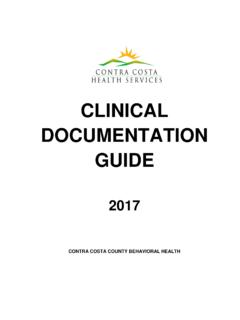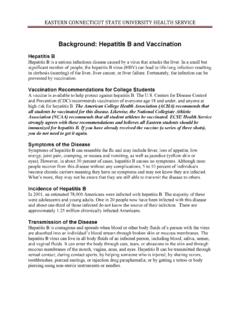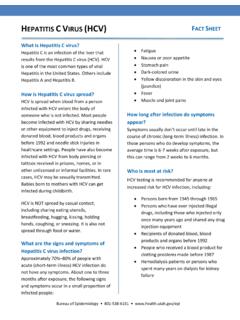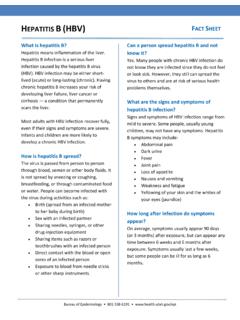Transcription of HEPATITIS B FACT SHEET What is Hepatitis B?
1 August 2014 HEPATITIS B fact SHEET what is HEPATITIS B? HEPATITIS B is a liver disease caused by the HEPATITIS B virus (HBV). Cases of HEPATITIS B can be acute or chronic. An acute case can last a few weeks while a chronic case can last many years. Many people with chronic HEPATITIS do not show symptoms, but when symptoms do appear, it is between 6 weeks and 6 months after being infected with the virus. what are the symptoms of HEPATITIS B? Diarrhea, nausea, vomiting, loss of appetite Joint pain, weakness and fatigue Dark color urine Yellowing of skin and white parts of eyes (called jaundice) Easy bruising or bleeding Who can get HEPATITIS B? Anyone can get HEPATITIS B, but there are some people who are at greater risk of HEPATITIS B, such as those who: Have sexual contact with an infected person Have multiple sex partners Have a sexually transmitted disease Are men who have sex with men Inject drugs or share needles Are exposed to blood during work Are infants with infected mothers How does a person get HEPATITIS B?
2 Contact with HBV-infected blood and body fluids. Examples include: Having sex with an infected person without using a condom; Sharing needles (used for injecting drugs) with an infected person; Getting a tattoo or piercing with tools that were not properly cleaned; Sharing personal items like razors or toothbrushes with an infected person; An infected mother can give the virus to her baby at birth; You CANNOT get HEPATITIS B from the sweat or tears of an infected person, or by exposure to a swimming pool, telephone, or toilet seat used by an infected person. While HBV is found in saliva, it is very unlikely to be a source of transmission. How is HEPATITIS B treated? There is no medication available for short-term (acute) HEPATITIS , but once a person has recovered from acute HEPATITIS B, they are protected from future HEPATITIS B infections. People with long-term (chronic) HEPATITIS B should consult their doctor about possible medication options. There are several new treatments available that can improve health and delay or reverse the effects of liver disease.
3 How is HEPATITIS B prevented? Vaccination is the most effective prevention method. It is given in a series of three shots, and is recommended for all children under the age of 18. Do NOT share personal items such as needles, razors, toothbrushes, or any item that may have blood on it. Use a condom or latex barrier during sex. Do NOT get a body piercing or tattoo with equipment that is not sterilized. August 2014 Do NOT donate blood, organs, or sperm if you have ever tested positive for HBV. For more information please contact Contra Costa Public Health at 925-313-6740 and visit our website at Additional information may be found at the following links.


















